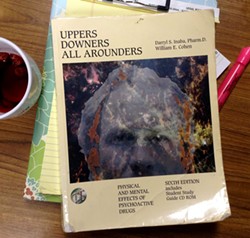[
{
"name": "Top Stories Video Pair",
"insertPoint": "7",
"component": "17087298",
"parentWrapperClass": "fdn-ads-inline-content-block",
"requiredCountToDisplay": "1"
}
]
There's a reason people find the phrase "gateway drug" so polarizing. It was popularized in the Reagan era, a time notorious for both misinformation and backward attitudes toward drug treatment and harm reduction. The narrative of cannabis as a gateway drug in anti-drug messaging relied largely on a reducto ad absurdum slippery slope of logical fallacy in which a tiny puff of the wacky tobaccy led straight to chasing the white dragon down inner city alleys. But the majority of Americans have tried pot at some point in our lives without becoming addicted to it or anything else. Evidence both empirical and anecdotal has proven this interpretation of pot as a "gateway drug" to be inaccurate.
But, according to my trusty old textbook on psychoactive drugs, Uppers, Downers and All-Arounders, backlash against the gateway drug propaganda "probably caused more drug abuse than it prevented." Why? Well, "it ... obscured an important idea: the real role that marijuana use plays in future drug use and abuse."
If the above paragraph made you shake your fist, let me attempt to persuade you with the sweet balm of science. I understand the emotional response to any vilification of a plant that has had such a profound economic, medicinal and social impact – with relatively benign health effects – but for the sake of discourse, stick with me.
Our understanding of addiction has evolved over the last half-century. We now know that it's not a moral failing, but something closer to a brain disease. Repeated use of an addictive substance actually rewires the brain, making us dependent on the substance to feel normal – physically and emotionally. Recently, science has uncovered some fascinating things about what makes people vulnerable to playing mad scientist with their brains in the first place. It has a lot to do with early childhood development, trauma and coping mechanisms. It's hard to summarize all of this in such a short column, and this is far from a complete picture of such a complex subject, but in short: If you aren't given the right kind of love and attention, if you start your life feeling broken, if you don't have the tools to deal with life on life's terms, you stand a much higher chance of substituting chemical shortcuts for emotional growth and healthy coping mechanisms. And the first chemicals that most people try in early adolescence are those easiest to obtain: Alcohol, nicotine and cannabis.
Few people become addicted to cannabis as their drug of choice. For my readers who wrote in disputing whether or not it's addictive at all, and saying that it's not physically addictive, I'd have to refer you to scientific studies and personal stories from addicts that are easily available online. Heavy smokers do experience mild physical withdrawal symptoms, and I also feel compelled to point out that the brain is part of the body, so the debate over psychological vs. physical addiction seems moot to me.
But if we learn to use cannabis (or alcohol or nicotine) to fulfill needs that might otherwise be met by healthy dopamine enhancers like good relationships, meeting important goals or downhill skiing, we leave ourselves vulnerable to developing more destructive dependencies. Our social groups and subsequent exposure to other drugs might also be determined by our early experimentation. Of course, it can be hard to parse out correlation from causation in this theory, just as the question of nature vs. nurture regarding the genetic aspects of addiction has yet to be fully answered. It's complicated. Addiction is complicated. The socioeconomic factors and childhood trauma that make our children vulnerable to addiction are complicated.
Let's acknowledge that it's complicated and get to work on addressing it. If taking that loaded phrase "gateway drug" out of the lexicon will help, there's another, more scientific-sounding term for the same phenomenon: escalation hypothesis. Whatever moves the conversation forward.
Comments
Showing 1-1 of 1
more from the author
-
Lobster Girl Finds the Beat
- Nov 9, 2023
-
Tales from the CryptTok
- Oct 26, 2023
- More »


































